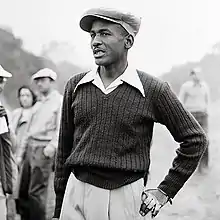Bill Spiller
Bill Spiller (October 25, 1913 – 1988) was an American professional golfer who helped break the color barrier in the sport.
| Bill Spiller | |
|---|---|
 Spiller at a tournament in the 1950s | |
| Personal information | |
| Born | October 25, 1913 Tishomingo, Oklahoma |
| Died | 1988 (aged 74–75) Los Angeles, California |
| Sporting nationality | |
| Residence | Los Angeles, California |
| Career | |
| College | Wiley College |
| Status | Professional |
Biography
Spiller was born in Tishomingo, Oklahoma and moved to Tulsa, Oklahoma as a nine-year-old to live with his father; the city is noted for its racial tensions at the time, including the Tulsa race massacre. He was an excellent athlete, a two-sport star in high school. Spiller went on to enroll at Wiley College in Marshall, Texas, and earned an education degree.[1]
He did not take up the sport of golf until he was about 30. Spiller moved to Southern California to try to make a living teaching, but he felt it was not enough to get by, taking up additional work as a railroad porter. Spiller was invited by another porter in Los Angeles to try competitive golf, and he started competing in and winning black-only amateur golf tournaments during the 1940s.[2]
In 1948, Spiller was denied entry into the Richmond Open golf tournament in Richmond, California, due to the PGA of America's segregation policy, which restricted participation to white people only.[3]
Spiller and fellow golfer Ted Rhodes filed a lawsuit challenging the PGA's discriminatory practices under the Taft-Hartley Act, but withdrew the suit after the PGA promised to end discrimination. However, the PGA continued to hold "invitational tournaments" from which African-American players were excluded.[3]
In 1952, Spiller and Joe Louis were excluded from the San Diego Open, leading to national attention and threats of legal action. Again, the PGA promised change, but continued the segregation clause. In 1960, California attorney general Stanley Mosk intervened, threatening to prohibit the PGA from using public courses unless it ended discriminatory practices. The PGA finally relented in November 1961, removing the segregation clause.[3]
Despite his efforts, Spiller's golf career had already been hindered, as he had started late and retired before the segregation clause was removed. In 2009, the PGA of America granted posthumous membership to Spiller, Rhodes, and John Shippen, and also honored Joe Louis with posthumous honorary membership.[4]
See also
- Pete Brown (1935–2015), first African-American to win a PGA-sanctioned tournament in 1964
- Lee Elder (1934–2021), first African-American to play in the Masters Tournament in 1975
- Charles Owens (1932–2017)
- Calvin Peete (1943–2015), most successful African-American on the PGA Tour, with 12 wins, before the emergence of Tiger Woods
- Charlie Sifford (1922–2015), first African-American to be member of the PGA Tour in 1961
- Tiger Woods (1975–)
- United Golf Association
References
- https://www.kjrh.com/ryan-love (May 20, 2022). "Bill Spiller: The Tulsa native who helped break PGA's color barrier". 2 News Oklahoma KJRH Tulsa. Retrieved August 14, 2023.
{{cite web}}: External link in|last= - Boyd, Herb (December 16, 2021). "Trailblazing golfer, Bill Spiller". New York Amsterdam News. Retrieved August 14, 2023.
- Barkow, Al (January 28, 2008). "One man's mission". ESPN.
- "PGA of America bestows membership upon late African-American pioneers". PGA of America. August 4, 2009. Archived from the original on September 7, 2009.